A short history of knee replacement surgery
A talk by Rotarian Pepe Pozo

A short history of Knee Replacement Surgery
Club member J. Louis Pozo (Pepe), a retired Consultant Orthopaedic Surgeon promised no blood during his entertaining presentation to Rotary members and partners But he did display and demonstrate during his talk a range of rather formidable metal prostheses to illustrate the development of knee replacement surgery.
Pepe received his initial medical education at Oxford University and University College Hospital. His post graduate orthopaedic experience was at a number of London hospitals, including the Royal National Orthopaedic Hospital at Stanmore and the Westminster-UCH Group.
Between 1989 and 2014 Pepe was a Consultant Orthopaedic Surgeon at the Royal United Hospital and the Royal National Hospital for Rheumatic Diseases in Bath.
The primary cause of knee problems leading to the requirement for knee surgery is he explained osteoarthritis. Among the causes for this condition can be trauma, Infection and inflammatory conditions such as Rheumatoid arthritis and Haemophilia. While conservative treatments, may provide short term relief, major surgery is the only sure way to provide long term relief.
Pepe spoke about the relative benefits of partial and total knee replacements. He described the work of a number of eminent orthopaedic surgeons ,many of them English, who had been involved over time with the evolution of knee prostheses. He said that although often seen as a 20th Century development the first successful knee replacement was in Berlin in 1890 by a Dr Gluck-now a forgotten figure.
John Insall with whom Pepe was acquainted in the US is seen as the father of knee surgery and designed four models of prostheses including the Total Condylar Knee in 1974.In addition to improved prostheses design the development of a rapid setting bone cement was a key factor in ensuring successful outcomes for knee surgery.
In addition to dealing with patients with “normal” knee problems Pepe showed slides of patients with knock knees and other serious knee deformities on whom he had operated. He told of one farmer who told him in West country terms “Oi can’t stop a pig in a corridor”. The reason was that his legs were so bowed he couldn’t close his legs. Pepe fixed it!
Knee surgery is becoming routine. In 1975 there were 1860 replacements a year but by 2017 there were 10,000.
And new knees are lasting longer. With over 15 years of data from Australia, New Zealand, Finland, Denmark, Norway and Sweden [but not the UK] the survivorship of knee replacements in 2019 was as follows.
Total Knee Replacements lasted between 15 years [93%], 20 years[90%] and 25years [82%]
Partial knee replacements lasted between 15 years [77%] 20 years [ 72%] and 25 years [70%].
As someone who had a total knee replacement in 2019 this is very encouraging news!
Peter McLoughlin
Related pages...
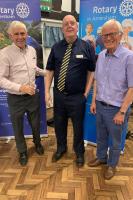
A wonderful hospice-at-home for children
more Trustee and founder Robert Breakwell talks about the Pepper Foundation and Pepper Show 30 April 2025
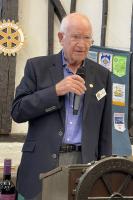
The 42-year adventure
more David Cadwallader speaks about his international career in marketing and advertising 16 April 2025
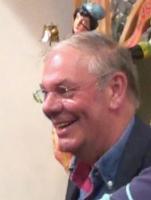
My time at Latimer House
more A talk by Peter McLoughlin

My Time with HM Inspectorate of Prisons
more A talk by Rotarian Jane Mackay
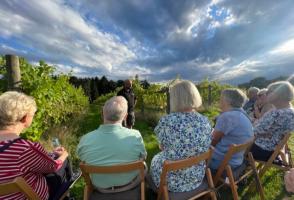
Visit to Oaken Grove Vineyard
more .
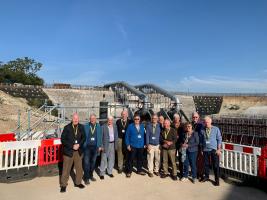
Club visit to HS2
more A visit to the South Portal